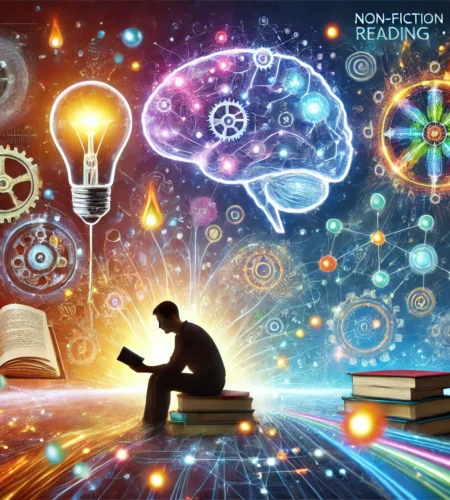Exploring non-fiction texts is an excellent strategy to enhance your cognitive abilities and broaden your understanding. By engaging with complex subjects and diverse genres, you can cultivate analytical thinking and expand your perspective on various topics. Reading non-fiction unlocks new insights and practical knowledge, equipping you to handle complex ideas effectively.
These texts offer more than just information, as they challenge you to think critically and analytically. This active engagement with non-fiction material not only strengthens your brain’s capacity to process information but also enhances your ability to tackle everyday problems with a fresh perspective. Non-fiction books, ranging from scientific papers to philosophical treatises, provide both depth and breadth in education.
Diving into non-fiction can also spark an interest in subjects previously unexplored, allowing you to continually grow and adapt. This continuous learning not only improves memory retention but also enriches your personal development journey. Embrace the power of non-fiction to transform the way you think and interact with the world around you, creating a more informed and agile mind.
Strategies for Effective Learning
Effective learning with non-fiction involves engaging with materials actively, thinking critically, and using structured note-taking to retain information. Implementing these strategies helps you develop your understanding and ability to use information creatively and effectively.
Active Reading Techniques
Active reading is essential when engaging with non-fiction texts. By questioning the material as you read, you stimulate your brain to think more deeply. Skim the text first to get a broad understanding and then focus on specifics, like key vocabulary and main ideas.
Highlighting important points and summarizing paragraphs can reinforce your comprehension. For example, when reading about expository text, notice how the text aims to educate. Identifying these informational elements can bolster your retention.
Critical Thinking and Analysis
Critical thinking transforms reading from passive intake to an engaging activity. Challenge the assumptions in the text and ask why the author presents certain ideas. This process helps you to scrutinize arguments and evidences critically.
Analyzing how the content aligns with your existing knowledge highlights disparities or confirmations. Applying these skills to non-fiction enhances your ability to discern valuable insights from mere opinions. Remember, effective analysis is not just accepting information but constructing a well-reasoned view based on it.
Retention through Note-Taking
Note-taking consolidates learning by transforming information into a digestible format. Choose structured methods such as the Cornell System, which separates notes into summaries, cues, and key points for easy review. Mind mapping can also be particularly effective for visual learners, aiding in the connection of concepts.
By regularly reviewing and revising your notes, you embed the information more deeply in your memory. Organized and deliberate note-taking ensures that the valuable insights you gain from non-fiction remain accessible and useful over time.
Optimizing Brain Health for Learning
To support the brain’s capacity for learning, it’s crucial to focus on factors that influence cognitive functions such as nutrition, exercise, sleep, and stress management. Attention to these areas can significantly enhance mental clarity, overall cognitive ability, and the brain’s resilience.
Nutrition and Brain Function
What you eat plays a powerful role in brain health and function. Foods rich in omega-3 fatty acids, such as salmon and walnuts, support brain cell structure and communication. Antioxidants found in fruits and vegetables protect brain cells from damage and may improve cognitive functions.
B vitamins, present in leafy greens and whole grains, are essential for neurotransmitter production and energy metabolism. Staying hydrated is also critical; even mild dehydration can impair cognitive abilities. It’s beneficial to maintain a balanced diet that includes a variety of nutrients to support sustained brain health and boost learning.
Exercise and Neurogenesis
Physical activity is not just beneficial for physical health but also plays a critical role in neurogenesis, the process of forming new neurons, particularly in the hippocampus, an area important for learning and memory. Aerobic exercises like running, swimming, or cycling increase blood supply to the brain, enhancing the growth of new brain cells and connections.
Exercise also elevates levels of brain-derived neurotrophic factor (BDNF), a protein that supports the survival and growth of neurons. Regular physical activity can lead to improved memory, attention, and problem-solving skills. Including consistent exercise in your routine is a practical approach to enhancing cognitive functions and mood, which collectively aids learning.
Sleep and Cognitive Recovery
Adequate and quality sleep is vital for cognitive recovery and consolidation of learning. During sleep, the brain processes and organizes information gathered throughout the day. Deep sleep stages are particularly important for memory consolidation and neural plasticity, the brain’s ability to reorganize itself by forming new connections.
Poor sleep patterns can lead to decreased attention span, impaired memory, and reduced problem-solving skills. It is crucial to prioritize a sleep schedule that allows for 7-9 hours of uninterrupted rest per night. This practice not only ensures emotional stability but also promotes optimal learning capabilities.
Stress Management Techniques
Chronic stress negatively affects brain health, impairing memory and inhibiting neurogenesis. Techniques that help manage stress effectively contribute to overall cognitive function and learning potential.
Mindfulness practices, such as meditation and deep-breathing exercises, reduce stress-related hormones like cortisol, enhancing focus and emotional regulation. Regular engagement in hobbies and leisure activities also provides a necessary cognitive break, allowing the brain to recharge. Implementing these stress management techniques helps maintain a balanced and sharp mind, enabling better educational outcomes and personal growth.
